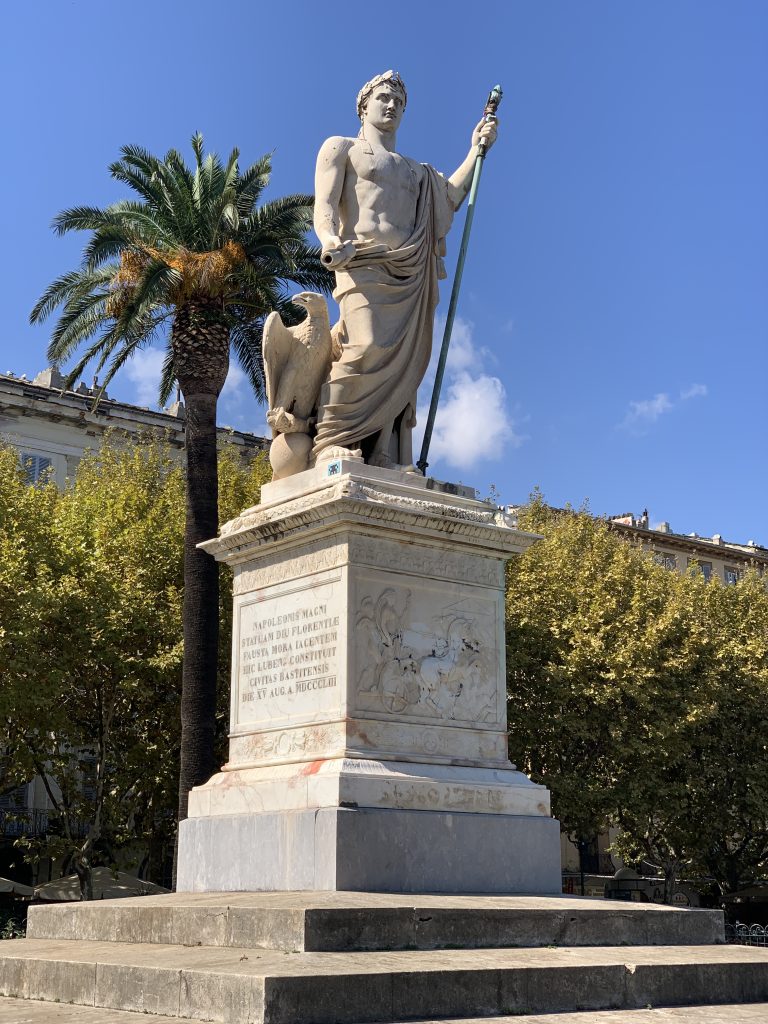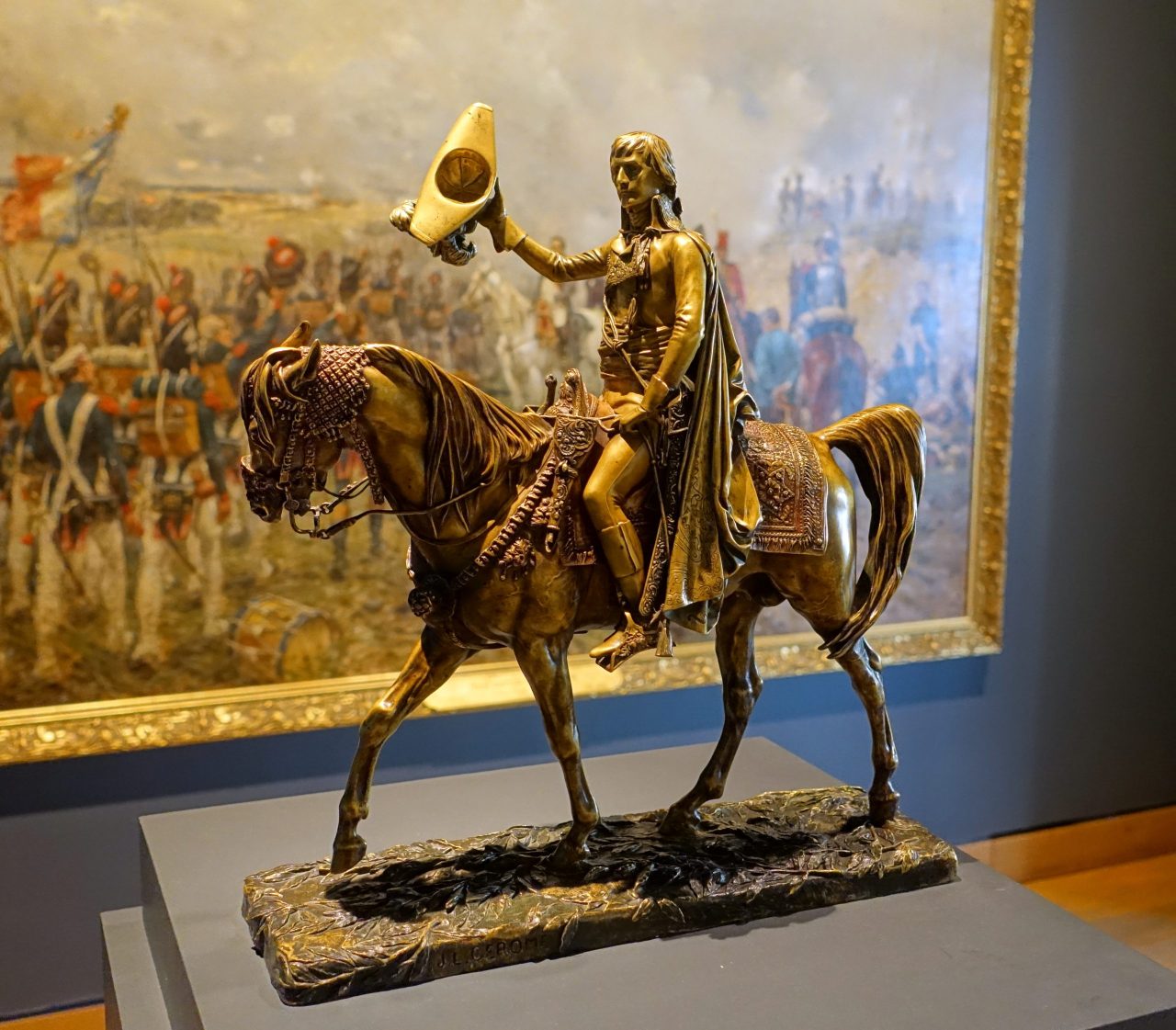
Bonaparte Entering Cairo, by Jean-Leon Gerome, c. 1897. Exhibit in the Montreal Museum of Fine Arts, Quebec, Canada
Napoleon’s fame as a brilliant military mind was a major contributor to his ascension to power. Observers of his meteoric rise were calling him a genius even before his great victory at Austerlitz in 1805. It was the Battle of Marengo on June 14, 1800, which sealed his position as First Consul.
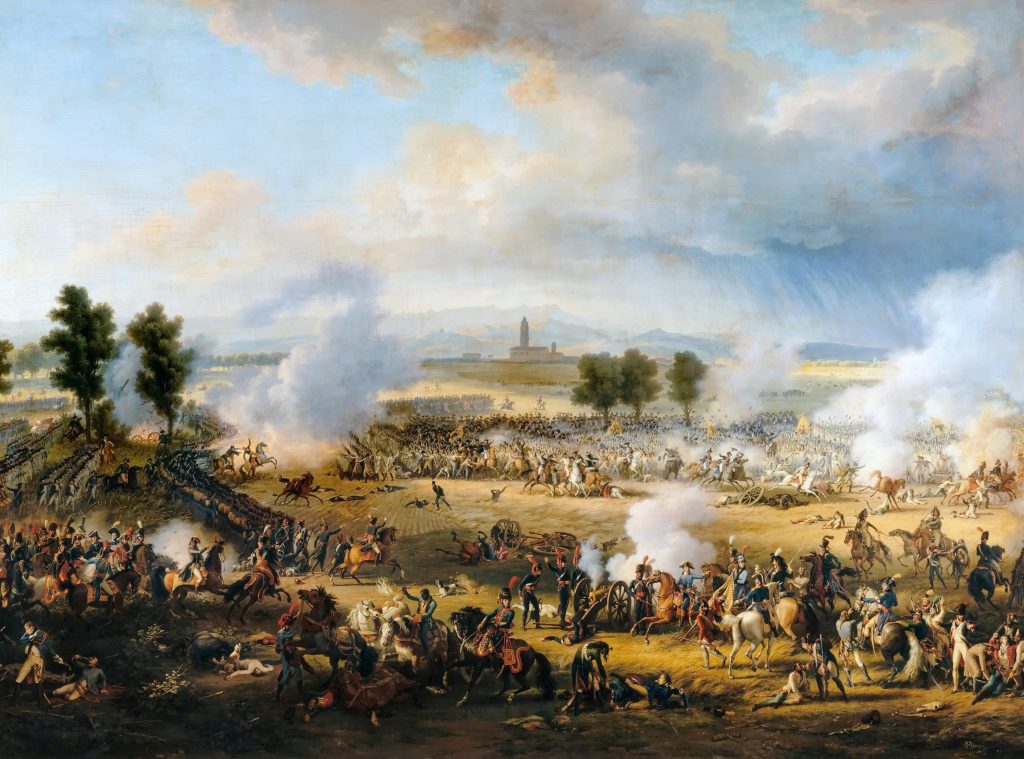
In that battle, General Bonaparte broke the rules of war by crossing the Alps at the San Bernardino pass – surprising the Austrian army sieging Genoa. It was a stunning victory carried out at much risk, and the meritorious retrospection that ensued by a grateful France turned what could have been a disaster into a legendary victory. The Observer of London noted that news of the victory in France “was received with loud cries of Vive la Republique” – accompanied by “a warm tribute to the genius of Bonaparte, and the sublimity and wisdom of his plans.”[1] In northern Italy, the newly resurrected “Cisalpine Republic, regenerated in the fields of Marengo by the genius of Bonaparte, has been desirous to immortalize that brilliant era, by making it the subject of the impression of its first coin,” reported the Times of London.[2] Praise even came from the French army in Egypt, where Bonaparte campaigned briefly:
Citizen Consul – You have by shining victories given to France the splendor of which events, no more perhaps to be mentioned, were about to deprive her. History will engrave in letters of gold the pacification of La Vendee, the re-establishment of the finances, and the confidence of the French; the passage of Saint Gothard and Saint Bernard, the battle of Marengo, and the conquest of a great part of Germany. History shall engrave the name and genius of Bonaparte presiding over all – directing all – repairing all.[3]
Napoleon himself later exploited the victory at Marengo to the fullest by taking measures to ensure the French would not forget it. However, according to the Morning Post, what made him even more dangerous than his success as a general was the ease with which he maneuvered in the political world. “Reigning with such arbitrary sway, Bonaparte avoids all acts of tyranny unnecessary to his power, and exerts himself to conciliate and attach all classes to his government.”
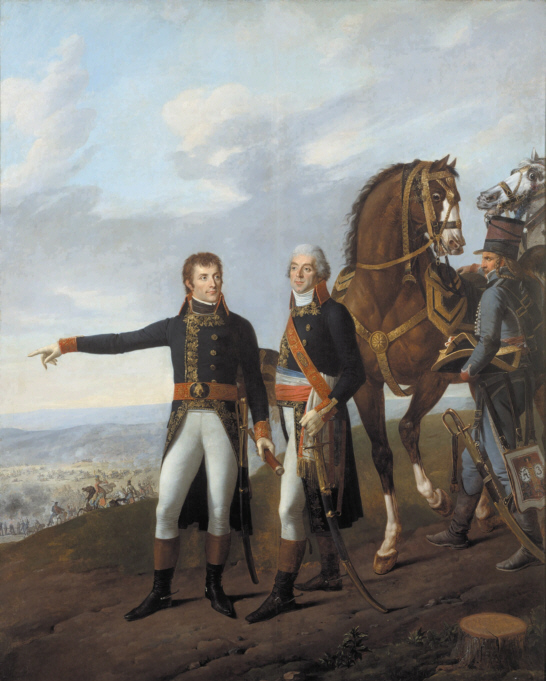
At the time, the Post’s editors were unaware of the underlying power-grab Napoleon was conducting in Paris, but they could see the outlines of an ambitious man on and off the battlefield. “All artists, and persons fond of the arts, admire Bonaparte as their greatest patron… the Chief Consul knows the influence they possess in society, the value of such partisans.”[4]
From ‘General’ to ‘Napoleon’
From 1800 on, the First Consul became less and less ‘General Bonaparte’ and more ‘Napoleon.’ The Constitution of the Year X (1802) granted him the title of First Consul for Life.
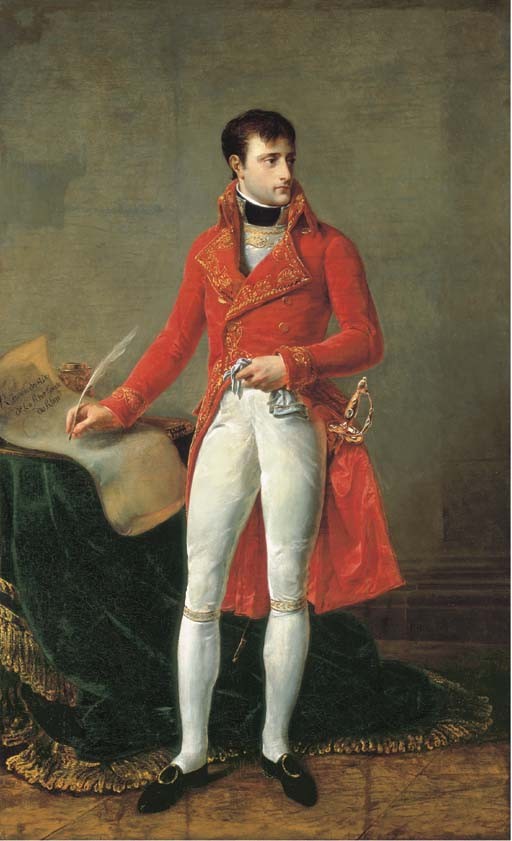
On August 3 of that year Senate President Francois Barthélemey presided over a public ceremony at the French Palace of the Government, where he addressed Napoleon:
The French, after astonishing the world by warlike exploits, expect from you Citizen Consul, all the benefits of the peace which you have obtained for them. If the seeds of discord still exist, the proclamation of Bonaparte’s perpetual Consulship will make them disappear – all have now rallied around him. His powerful genius will know to maintain and preserve everything. He lives only for the prosperity and happiness of the French. […] The Senatus-consultum which the Senate in a body has transmitted to you, Citizen First Consul, contains the expression of their particular gratitude.[5]
Napoleon and Hannibal: The Military Legend
It was after the wars when Napoleon’s military legend increased. His failures were forgotten to a certain extent, and his victories became the focus of military studies in Europe and in the United States. On February 6, 1826, Edinburgh’s Caledonian Mercury noted how a recent Copenhagen publication known as the Military Magazine “ingeniously pursued” a comparison between Napoleon and the ancient Carthaginian general and statesman Hannibal. During the Second Punic War (218-201BC), Hannibal marched his army overland through Iberia and Cisalpine Gaul to surprise and ultimately defeat a Roman force of more than 80,000 soldiers on August 2, 216BC at the Battle of Cannae:
Both of these great warriors, says the writer, carried war into the bosom of the enemy’s country; both passed the Alps; both employed the infantry in masses. Napoleon formed a reserve of veterans; Hannibal did the same in Zama. Both were skillful in inflaming the courage of their troops by harangues; and both knew well how to meet danger at the right moment. Both of them rose at an early age to the highest dignities…[6]
While the Military Magazine lauded Hannibal’s command at the Battle of Zama on Carthaginian soil in 202BC, they may have overlooked the fact that the Romans triumphed over their ancient enemy – and in doing so, subjugated their rival until their final destruction in the Third Punic War (149-146BC). In a romantic era, however, such details were unimportant, and these comparisons easily made their way into American newspapers.
By 1838, South Carolinians were invoking military legends when contemplating seccessionist strategies. In this analogy, the southern states represented Carthage. Thus, Napoleon and Hannibal were forever linked in the minds of many:
For whether we scale the interposing mountain barriers, like Hannibal, or turn them like his more skillful successor and rival, the line of operations which will carry us to the centre of this immense theatre of competition, will be but half as long as our Northern rivals… And though we may never defeat the Romans in successive battles, nor drive the Austrians out of Italy, by annihilating successive armies, we shall perform an achievement more glorious than that of either Hannibal or Napoleon, while we conquer and bless by the peaceful weapons of industry and enterprise…[7]
[1] The Observer, London, June 29, 1800.
[2] The Times, London, October 20, 1800.
[3] Caledonian Mercury, Edinburgh, December 25, 1800. General Jacques Menou, Army of Egypt, Cairo, November 1, 1800.
[4] The Morning Post, London, September 5, 1801.
[5] Caledonian Mercury, Edinburgh, August 12, 1802.
[6] Caledonian Mercury, Edinburgh, February 6, 1826.
[7] Camden Courier, South Carolina, March 10, 1838. “Of the Convention, to the People of the Southern and Southwestern States”
